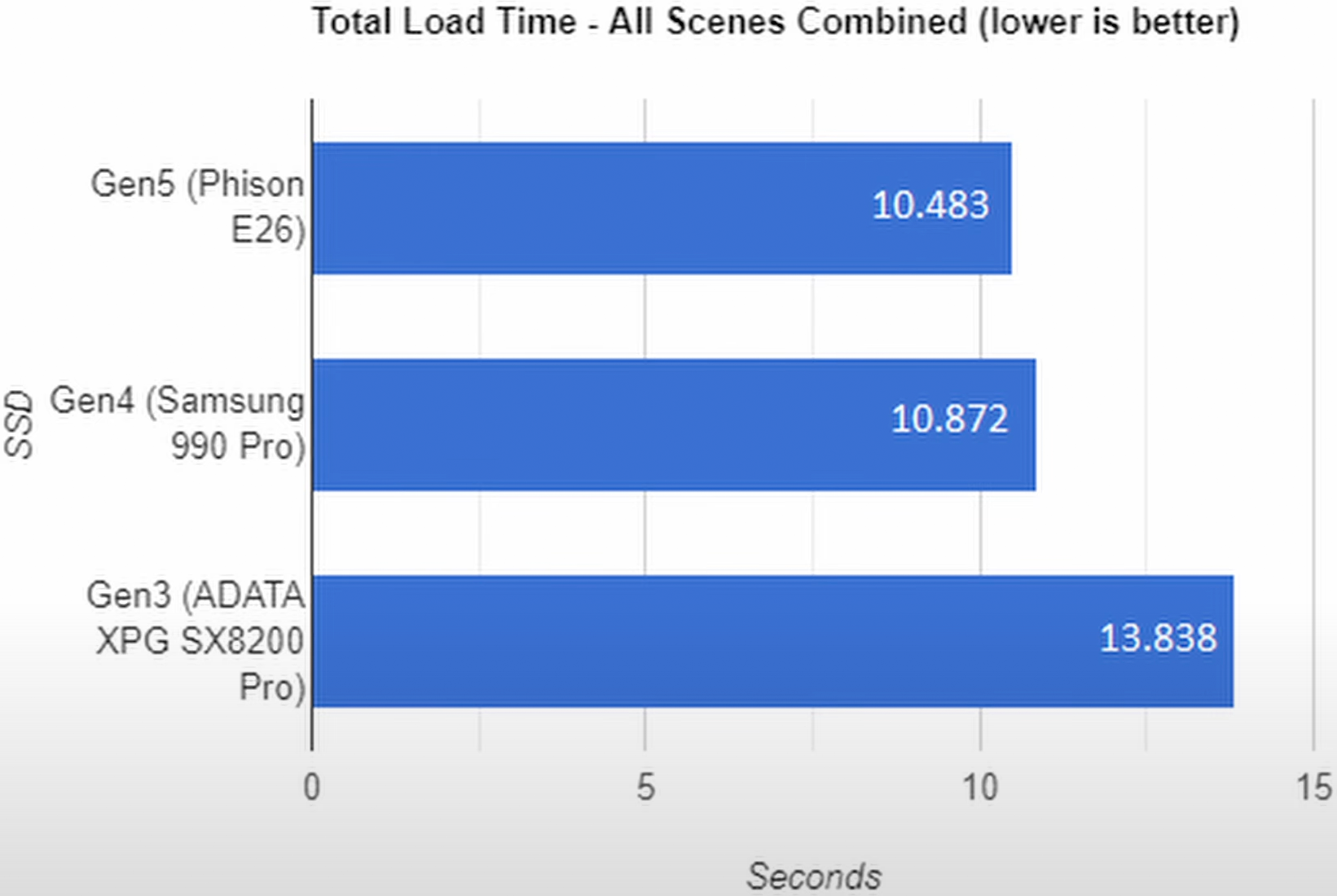DirectStorage Testing Shows PCIe 3 SSDs Are Basically as Fast as PCIe 5
In both load times and FPS
Solid-state drives with different PCIe interfaces tend to deliver very different performance times in typical applications under high workloads, due to bandwidth constraints. But it looks like the difference between PCIe Gen3 and PCIe Gen5 drives may not be that significant with DirectStorage, according to load times from a built-in Forspoken benchmark by Compusemble.
There are two key advantages that Microsoft's DirectStorage 1.1 application programming interface brings to games: faster load times, aided by asset compression/decompression algorithms handled by the SSD controller and GPU that enable them to transfer more data than the storage medium is normally capable of, as well as reduction of CPU load when dealing with NVMe requests, which allows for faster and more efficient transfer of assets from storage to the graphics subsystem.
We already know that DirectStorage can greatly alleviate data transfer rates of solid state drives, even for SSDs with a SATA interface. This reduces load times, and it also raises the question of whether SSDs with different interfaces will deliver different experiences in DirectStorage-enabled games. As it turns out — not really.

Load times in Forspoken are greatly reduced, so even when you combine the load times of seven different levels/scenes in the built-in benchmark, the difference between an advanced Phison E26-based SSD (the controller that will power the best SSDs this season) with a PCIe Gen5 x4 interface and a mature Adata XPG SX8200 Pro with a PCIe Gen3 x4 interface is a negligible three seconds.
On paper this means that the PCIe Gen3 drive is 32% slower than a PCIe Gen5 SSD, but in reality the difference is unnoticeable across seven scenes. Meanwhile, raw data throughput supported by a PCIe 5.0 x4 interface is about four times higher compared to a PCIe 3.0 x4 interface. So DirectStorage compression not only works, it also blurs the line between different SSDs.
Of course, there's only one game that supports Microsoft DirectStorage today, so it still makes sense to get a PCIe Gen5 x4 drive for a new build. But the good news is, once DirectStorage gains traction, that SSD is likely to perform on par with the next generation of drives in games.
Get Tom's Hardware's best news and in-depth reviews, straight to your inbox.

Anton Shilov is a contributing writer at Tom’s Hardware. Over the past couple of decades, he has covered everything from CPUs and GPUs to supercomputers and from modern process technologies and latest fab tools to high-tech industry trends.
-
PlaneInTheSky Note that a lot of benefits found in DirectStorage have little to do with the speed of the SSD.Reply
A lot of changes in Directstorage 1.0 are about software overhead when the GPU has to access assets. You can notice these benefits even when using SATA SSD.
And the major change in DirecStorage 1.1 is GDeflate , that uses the GPU instead of the CPU to decompress assets like textures and shaders. While you do need a regular NVMe SSD to be able to get all those assets to the GPU in a timely manner, a PCIe 3.0 SSD works just fine. The real cut in loading times is due to the GPU doing the decompression instead of the GPU.
The reason why a game won't load instantly yet, even with DirectStorage 1.1, has nothing to do with hardware anymore. They're largely network calls, to DRM servers, Denuvo bloat, etc. -
PlaneInTheSky ReplyNo baseline results? What's the load time WITHOUT directstorage enabled?
DirectStorage cuts loading times in Forspoken by about 36% on average.
Significant, but not earth-shattering either. Forspoken also uses Denuvo, which we know impacts loading times in games, and DirectStorage has no effect on that.
-
tennis2 ^ that chart is using a Samsung 990 Pro (PCIe4.0).Reply
Just so people can compare/extrapolate if they want. -
AgentBirdnest The sample size of DirectStorage games is one, and that game is about as optimized as a plate of spaghetti.Reply
Probably not a great idea to make DirectStorage conclusions based on this one game, alone. -
CRamseyer The built in benchmark doesn't take into account longterm gameplay where the same files are read thousands of time per hour. Not only that, the game doesn't use GDeflate.Reply -
hotaru251 Replyso it still makes sense to get a PCIe Gen5 x4 drive for a new build.
why?
if the performance is a mere3seconds load...save $ and get cheaper, larger capacity drive.
might even not need a high end MB since pcie gen 5 has little use now (not even gpu can use all of gen4) -
RichardtST So... If the speed of the drive matters very little, but DS being on or off matters roughly 35-50%, that would imply that the interface is mostly avoiding a bunch of software bloat. And there is only so much bloat that Windows will allow you to remove. Perhaps attach the storage directly to the GPU with a small coprocessor running a stripped little file-access-oriented OS? Remove the problem (Windows) completely. That would be a cool little project!Reply -
tamalero Reply
I'm sorry but getting a 36% loading boost on average with no additional expenses or changes to hardware is def worth every bit of it. "Not Earth shattering" XDPlaneInTheSky said:DirectStorage cuts loading times in Forspoken by about 36% on average.
Significant, but not earth-shattering either. Forspoken also uses Denuvo, which we know impacts loading times in games, and DirectStorage has no effect on that.
If they can make the scenes load almost instantly, its worth it for seamless gameplay. -
Fates_Demise Replyhotaru251 said:why?
if the performance is a mere3seconds load...save $ and get cheaper, larger capacity drive.
might even not need a high end MB since pcie gen 5 has little use now (not even gpu can use all of gen4)
It's 3 seconds for that game, games 5 years from not might be 30 seconds+. Future proof your build if the price is justified.